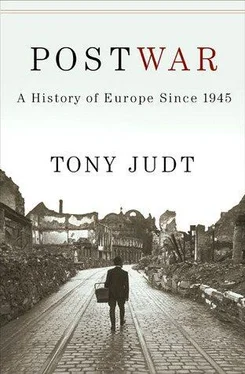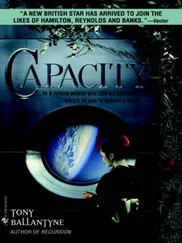There was, of course, never any question of Pershings or Cruises being deployed in France itself…
It emerged after 1990 that at least 25 Bundestag members in these years were paid agents of the GDR.
On December 13th 1981, the day martial law was declared in Poland, Schmidt was in the GDR holding ‘summit talks’ with his counterpart Erich Honecker and was somewhat put out, less by the imprisonment of hundreds of Polish dissidents than by the potentially ‘destabilizing’ impact of Polish developments on improving inter-German relations.
Thanks to an ever-larger GDP, the defense element in American public expenditure had fallen steadily in relative terms from the mid-Fifties through 1979, even during the Vietnam years. It then increased dramatically: as a percentage of Federal outlay, defense spending in 1987 was up by 24 percent on 1980 levels.
In fact Gorbachev’s own family had suffered greatly under Stalin: both of his grandfathers were imprisoned or exiled in the course of the dictator’s purges. But the new Soviet leader did not even acknowledged the fact until November 1990.
‘Mais c’est quoi, la dialectique?’ ‘C’est l’art et la manière de toujours retomber sur ses pattes, mon vieux!’ Jorge Semprún, Quel Beau Dimanche (Paris: Grasset, 1980), p. 100.
This was the subject of a book by Zhores Medvedev, Nuclear Disaster in the Urals , published in exile in 1979.
In an opinion poll taken some months later, in January 1990, Gorbachev ranked just after Peter The Great in public favour—but far behind both Karl Marx and V. I. Lenin…
It was Sakharov who forced the issue into the open by demanding—on live television—the abrogation of Article Six and the return to the peoples’ representatives of the power ‘stolen’ by the Party in 1918. Gorbachev himself finally switched off Sakharov’s microphone, but too late.
He also made a point, at Chernenko’s funeral in March 1985, of meeting and greeting Alessandro Natta, the head of the Italian Communist Party, until then perennially in Moscow’s bad graces.
In an ironically apposite echo of the American fiasco in Vietnam, the puppet regime in Kabul—now bereft of armed support from abroad—limped on until 1992 before succumbing (its international guarantors notwithstanding) to the forces of the Taliban.
Andrei Grachev, quoted in Archie Brown, The Gorbachev Factor (Oxford, 1997), p.88.
In 1986 the US lifted its veto on Polish membership of the IMF, in return for the release of all remaining political prisoners and a general amnesty.
See Harold James, International Monetary Cooperation since Bretton Woods (IMF + Oxford University Press, 1996), p. 567.
Officially the site of Nagy’s grave had remained unknown for thirty years; in fact its location, in an obscure and unmarked corner of the Budapest Municipal Cemetery, was public knowledge.
I am grateful to Professor Timothy Garton Ash for this reference.
It appears that Honecker had calculated, reasonably enough, that Gorbachev would not last and could safely be ignored.
Three days after Gorbachev’s visit Honecker received a visiting Chinese dignitary and compared the unrest in the GDR with China’s recent ‘counter-revolution’. It seems likely that he was at least contemplating a German re-play of the Tiananmen Square massacre—one reason why his colleagues took the decision to oust him.
To be fair, the East German dissidents genuinely misread the courage of the crowds in November 1989 as the basis for a renewed socialist republic. On the other hand, the source of that misreading was their blind failure to understand what ‘socialism’ had come to mean—and their own investment in its survival.
In certain respects its Polish equivalent came in 1980-81—the political transition in Poland a decade later was an altogether more calculated and negotiated affair.
The author, who was in Prague at this time, can vouch for the intoxicating feeling that history was being made by the hour.
A cartoon in one of the ephemeral Prague student newspapers of December 1989 perfectly captures the generation gap. A paunchy middle-aged man in an undershirt stares with distaste into his shaving mirror at a blowsy woman in the doorway, a dirty nightgown draped over her shoulders, her hair in rollers, a cigarette dangling from her lips. ‘Don’t you recognize me?’ she taunts him. ‘I’m your dream of 1968.’
‘If a people have never spoken, the first words they utter are poetry.’ Ferdinando Camon in La Stampa , ‘Tutto Libri’, December 16th 1989.
At least until the rise of Mikhail Gorbachev, after which the West had no further use for an anti-Soviet maverick.
The trial and execution by firing squad were filmed for television, but not shown until two days later.
Officially, of course, the Turks didn’t exist: ‘There are no Turks in Bulgaria’ (Dimitur Stoyanov, Interior Minister).
Such considerations did not always apply in remote rural communities and small provincial towns, where the police continued to the very end to operate unhindered by television cameras or public disapproval.
A backhanded nod to the Sixties’ only lasting monument, the idea that youth is an inherently superior condition—in the words of Jerry Rubin: ‘Never trust anyone over 30.’
This line of reasoning was developed by Voltaire, among others, and is elegantly explicated by Larry Wolff in Inventing Eastern Europe (Stanford, 1994).
Even Reagan’s initial response to the declaration of martial law in Poland was distinctly lukewarm. Only after loud public criticism (from Henry Kissinger, among others) did official Washington adopt the hard-line stance for which it became better known.
In August 1989 the deputy chairman of the Social Democratic Party had criticized the Kohl government for ‘aggravating’ the crisis by welcoming East German refugees who were seeking to come west via the newly opened Hungarian border. However in Berlin (a traditional SPD stronghold) the SPD did much better in the elections of 1990, winning 35 percent of the vote.
Bohley’s own response was to observe somewhat sourly: ‘We wanted justice and we got the Rechtstaat [constitutional state].’
De Maizière’s second act was at last to acknowledge East Germany’s shared responsibility for the Holocaust and allocate DM6.2 million for reparations.
It is no coincidence that Mitterrand was the only major Western political figure to accommodate himself without hesitation to the apparent overthrow of Gorbachev in the abortive Moscow coup of the following year.
Читать дальше












